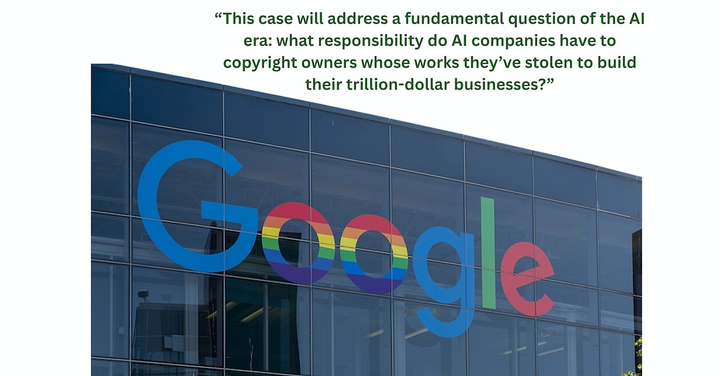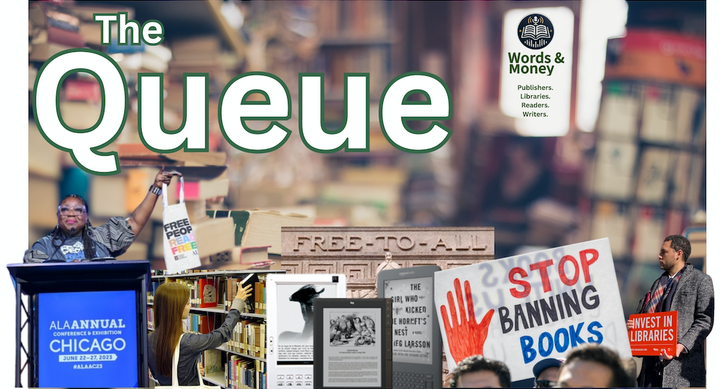The Queue: Library News for the Week Ending June 27
Among the week's headlines: two key fair use decisions roil the AI landscape; A major Supreme Court decision threatens the freedom to read; Texas signs its controversial school library bill into law; and the Library of Congress faces a budget cut.
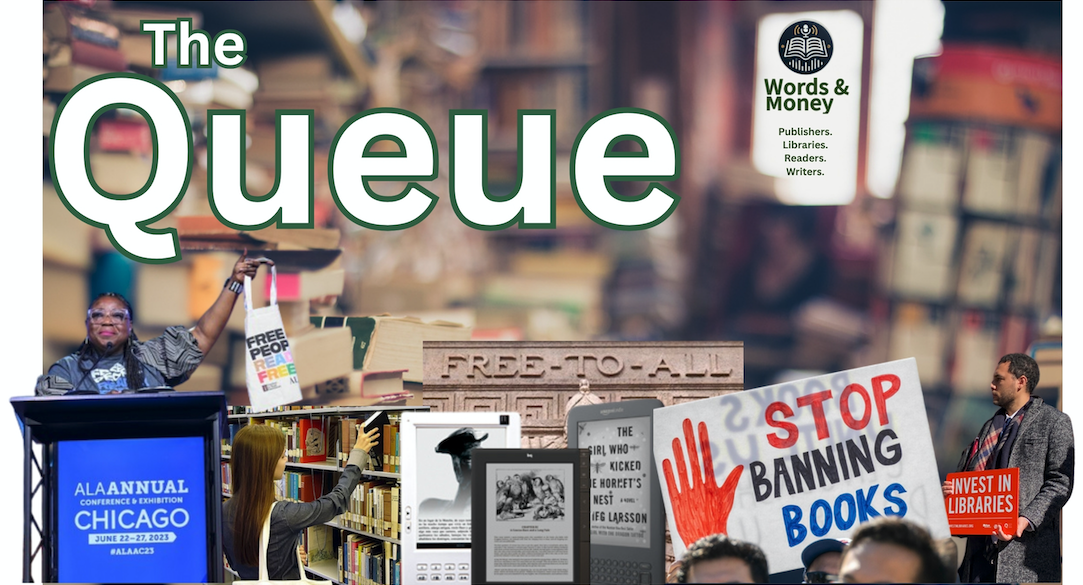
AI will be a hot topic in the professional program at the 2025 ALA Annual Conference in Philadelphia, which gets underway today. And right on cue, the first two court decisions from the dozens of lawsuits over the use of copyrighted works to train AI models dropped this week.
While the general consensus is that the decisions favor AI developers, the two rulings offer fascinating if sharply differing takes, and each comes with significant caveats.
Bloomberg News reports that in his June 23 summary judgment decision in Bartz et al v. Anthropic PBC, judge William Alsup "lays down a provisional roadmap for AI companies" by finding that Anthropic's use of copyrighted books to train its Claude AI system is transformative and thus fair use (including books alleged to be taken from pirate sites and books it purchased, cut up, and scanned.) However, Alsup also found that the company must answer for keeping copies of unauthorized works it downloaded for a "general purpose" library.
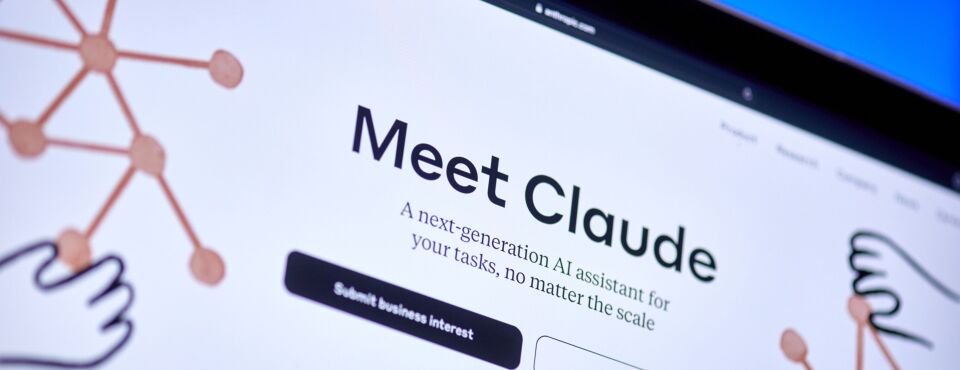

"The part of the ruling that went against Anthropic is going to sting; Anthropic could wind up owing authors hundreds of millions of dollars for past copyright infringement," writes Tim B. Lee at Understanding AI. "But the other half of the ruling is far more important because it’s the first time a court has said it’s legal to train AI models using copyrighted content without permission from rights holders."
For Medium, Emory University's Matthew Sag has an excellent, must-read post breaking down Alsup's decision.

"My take is that Anthropic’s multi-billion dollar loss in Bartz v. Anthropic is really a win for AI," Sag concludes. "The ruling provides a clear path forward for AI companies, recognizing that training on copyrighted works can qualify as a fair use when those works are lawfully acquired and when there is no evidence of infringing outputs... Bartz v. Anthropic will not be the last word on LLM training and copyright, but it is not a bad place to start."
Meanwhile, in a second ruling this week, in a lawsuit filed by 13 authors, Kadrey v. Meta, federal judge Vince Chhabria also found that training on copyrighted books was transformative, but lamented how the case before him was presented and suggested that given a different legal argument he may well not find fair use, despite the transformative nature of the technology.
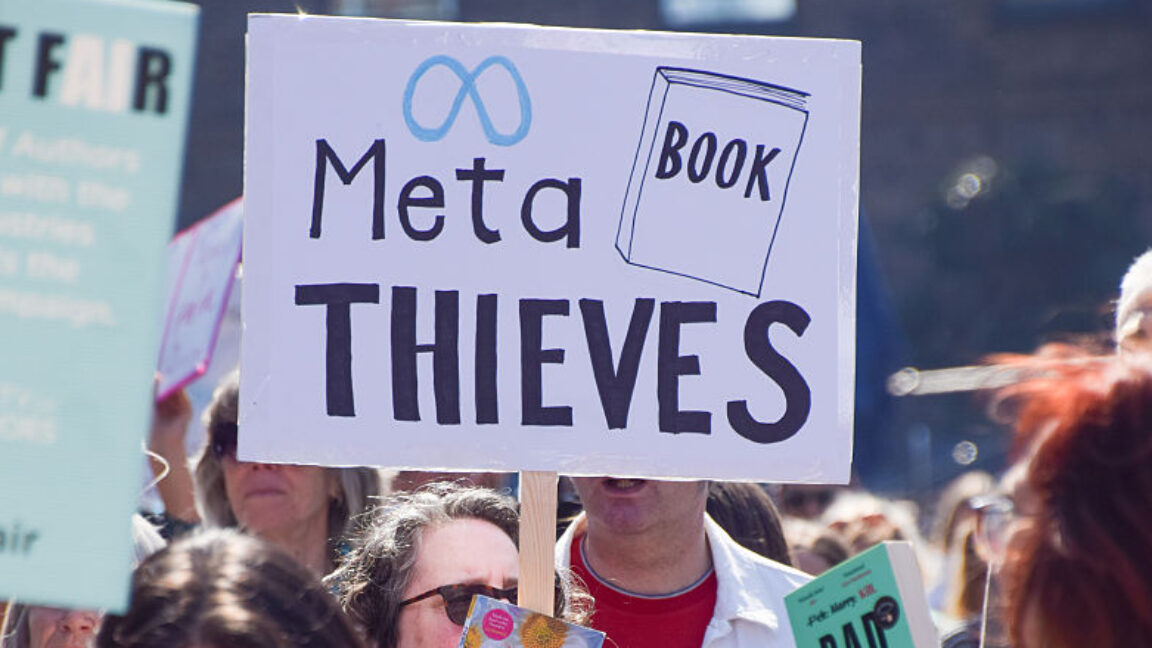
"This week's rulings suggest that the question of whether AI training is transformative has been largely settled," reports Ars Technica. But Chhabria clearly held his nose in ruling for Meta, the report goes on to note, with the judge delivering a stinging assessment of how AI is developing.
"The technology is certainly groundbreaking. But the suggestion that adverse copyright rulings would stop this technology in its tracks is ridiculous," Chhabria concluded. "These products are expected to generate billions, even trillions, of dollars for the companies that are developing them. If using copyrighted works
to train the models is as necessary as the companies say, they will figure out a way to compensate copyright holders for it."
Chhabria also offered a more expansive look at the harm AI could wreak on authors.
"No matter how transformative LLM training may be, it’s hard to imagine that it can be fair use to use copyrighted books to develop a tool to make billions or trillions of dollars while enabling the creation of a potentially endless stream of competing works that could significantly harm the market for those books," the judge concluded.
On Bluesky, Cornell Tech law professor James Grimmelmann broke down the two rulings, and sounded a hopeful note, that, so far, the courts are at least well-engaged with the issues raised by AI.
Kadrey v. Meta just dropped storage.courtlistener.com/recap/gov.us...
— James Grimmelmann (@jtlg.bsky.social) 2025-06-25T21:41:25.253Z
"Even though they disagree extensively, both opinions are thoughtful and well-argued," Grimmelmann concludes. "They take the parties' arguments and the copyright-policy issues seriously. Neither judge is a partisan for copyright owners or AI companies. Both are well worth reading if this is a legal issue you care about."
LitHub Ponders AI Rulings Impact on Libraries, Authors

Over at LitHub, Aron Solomon questions what the fair use decisions in the first two AI lawsuits could mean for libraries and the future of authorship.
"The doctrine of fair use was crafted in an era of ink and printing presses. It was designed to allow limited, socially beneficial reuses of copyrighted material: parody, commentary, teaching. It protected the ability to quote, to remix, to criticize—all human acts with a clearly observable 'transformative' purpose. It was never built to handle models that devour gigabytes of creative work, crunch it into statistical patterns, and use that substrate to generate eerily familiar prose," Solomon writes. "What we need isn’t just a new ruling. We need a new understanding. One that asks not just what’s 'legal,' but what’s just."
PEN America, Authors Respond to Supreme Court's Mahmoud Decision
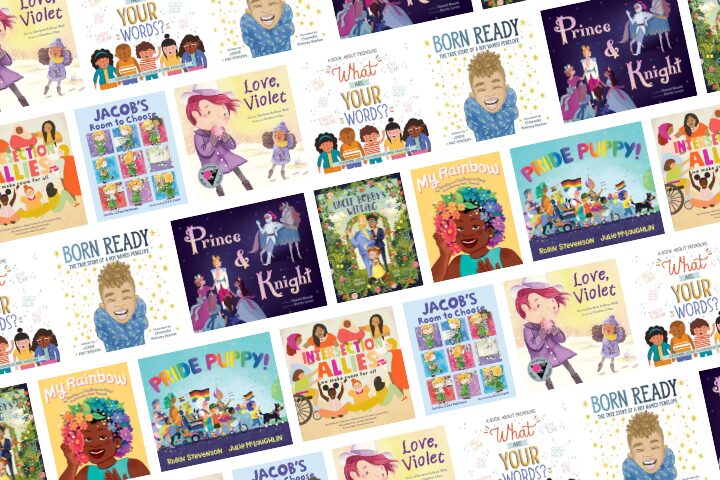
In the wake of the Supreme Court's decision in Mahmoud Mahmoud v. Taylor, PEN America and the authors involved in the case have released a statement.
"We believe the Supreme Court’s ruling today threatens students’ access to diverse books and undermines teachers’ efforts to create safe, inclusive classrooms. To treat children’s books about LGBTQ+ characters differently than similar books about non-LGBTQ+ characters is discriminatory and harmful," the statement reads. "This decision will inevitably lead to an increasingly hostile climate for LGBTQ+ students and families, and create a less welcoming environment for all students... We will continue to support LGBTQ+ families and children everywhere and advocate for the right of all students to read freely. We strongly disagree with the Court’s decision."
Pew Report: Americans Don't Pay for News
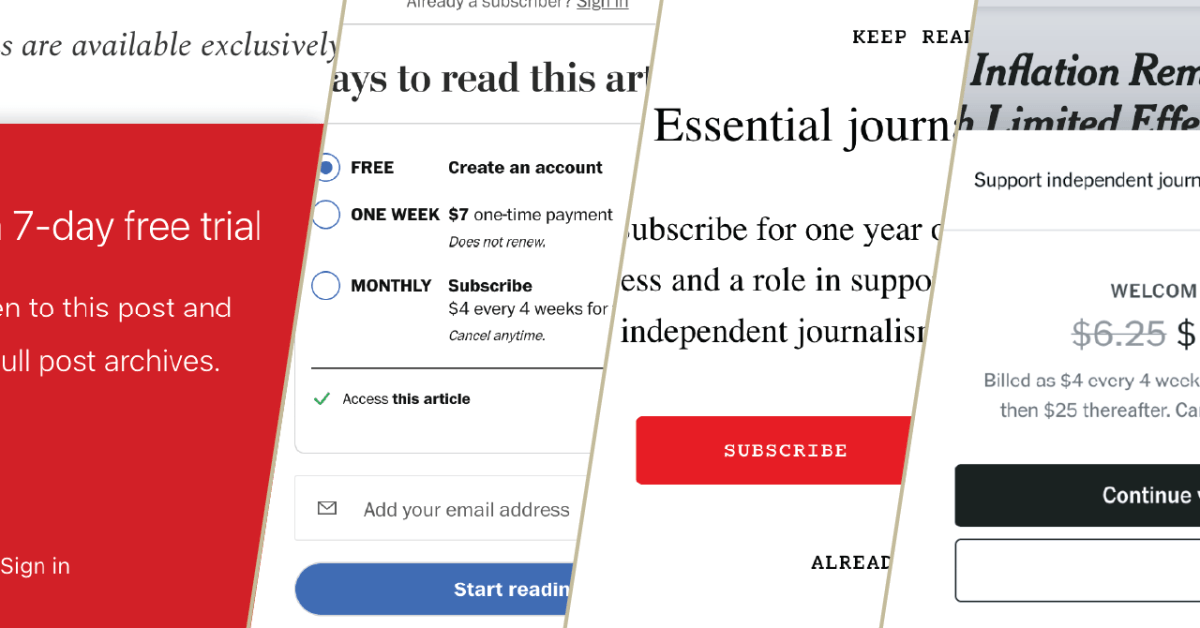
Here's a wake-up call, though anyone in media will not find it surprising: few Americans pay for news online when they hit a paywall.
"Among the 83% of U.S. adults who have not paid for news in the past year, the most common reason they cite is that they can find plenty of other news articles for free. About half of those who don’t pay for news (49%) say this is the main reason," the report notes. "Another common reason people don’t pay for news is that they are not interested enough (32%). Smaller shares of Americans who don’t pay for news say the main reason is that it’s too expensive (10%) or that the news provided isn’t good enough to pay for (8%)."
Penguin Random House honored for Defending the Freedom to Read

Penguin Random House has been named one of Time.com's "most influential companies," with the outlet citing the publisher's industry-leading efforts to fight book bans. It's a well-deserved honor.
"Nonprofits, schools, and parents aren’t the only ones battling it out—publishing giant Penguin Random House has jumped into the fray, suing Florida, Iowa, and other state governments on constitutional grounds to overturn legislation that gives school districts the green light to remove books with sexual content," Time writes. "But the company isn’t just playing legal defense. In 2024, it ramped up legislative advocacy efforts, working with a coalition of library and educator allies supporting 'Freedom to Read' laws, which generally prohibit libraries from banning books for discriminatory reasons and strengthen legal protections for librarians."
Meanwhile, during the opening session of the ALA Annual Conference this afternoon, one of the driving forces behind the publisher's efforts, Skip Dye, willl be awarded the ALA's highest honor for his work supporting libraries.
Georgia Librarian Fired Over Summer Reading Display

Georgia Public Broadcasting reports that a Georgia librarian was fired for including a book with a transgender character in a summer reading display.
"Library manager Lavonnia Moore was fired from the Pierce County Public Library last week after 15 years of service. She said she worked with community volunteers earlier this month to create a book display. That display, themed “Color Our World,” included a book called When Aiden Became a Brother, about a family loving and accepting a transgender child," the report states. "After the religious group Alliance for Faith and Family campaigned against her, asking followers on social media to email concerns to library officials and the Pierce County Board of Commissioners, Moore said she was fired."
Moore said she is seeking legal assistance, and has launched a GoFundMe.
Idaho Consortium Fractures Over Restrictions on Minors
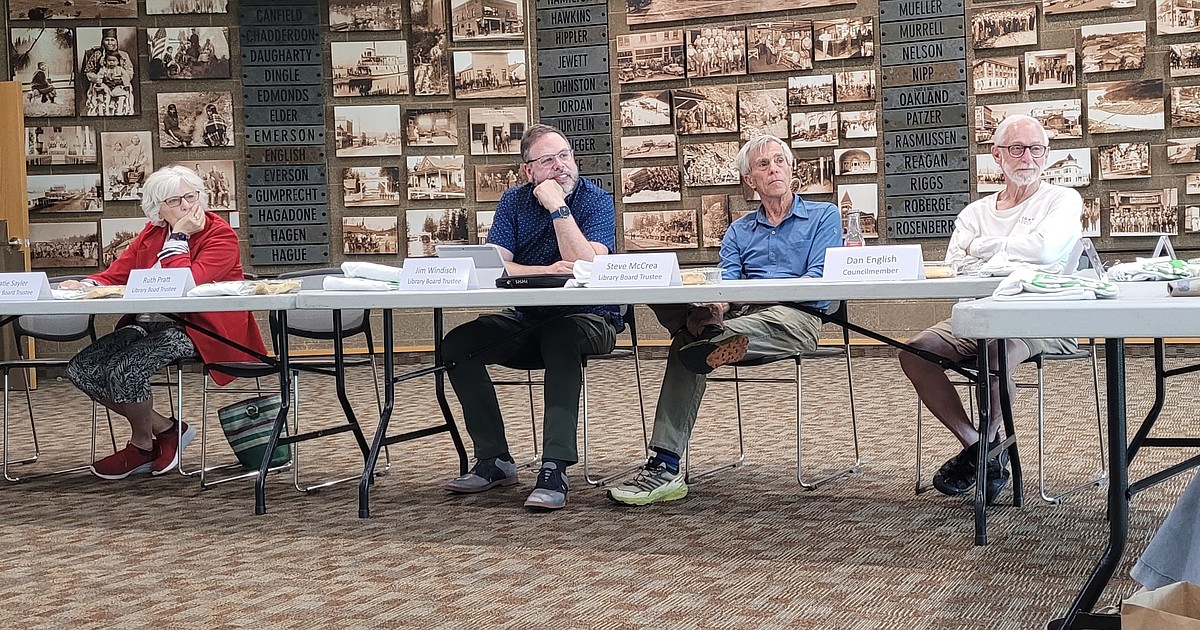
The Coeur d’Alene/Post Falls Press reports that the Coeur d’Alene (Idaho) Public Library trustees have voted in favor of dissolving a regional library consortium, The Cooperative Information Network, with updated policies among some members over how minors can use the library apparently at issue.
"The updated policy states that minor cards 'cannot be used to reserve physical or electronic materials from other libraries in the Cooperative Information Network' and bar minor library patrons from accessing material deemed 'harmful to minors,' regardless of the wishes of their parents or guardians." the report states. Couer d'Alene board members believe those restrictive policies are overzealous and confusing. "As a parent, if my child was still in the system, I’d be upset,” one board member told the Press. “I want to parent my child. I don’t want them to parent my child. They’re overstepping.”
Ohio Legislators Send Budget to Governor with $25 Million Cut for Libraries and an Anti-LGBTQ+ Provision

Via WOSU and the Statehouse News Service, Ohio lawmakers have sent a two-year budget proposal to Governor that includes a $25 million cut for libraries, an unpopular new funding formula, and a controversial censorship provision.
"State funding will be reduced to $479.7 million in the first year of the budget, which is a loss from the $504.6 million that was distributed to libraries in the current fiscal year," the report notes. "The Ohio Library Council said it's also concerned about a provision ordering libraries to ensure materials related to sexual orientation or gender identity can’t be seen by minors."
Ohio Library Council Executive Director Michelle Francis questioned the legality of the anti-LGBTQ provision. “We do feel like it's censorship in this case. The language is is overly broad and vague. This is really up to the individuals. Our job as libraries is to make sure that people have access to information,” Francis told the outlet. "We do believe the language is unconstitutional. And in fact, similar language has been found to be unconstitutional in Arkansas."
DeWine has until June 30 to sign the budget, though he can issue line item vetoes.
California 'First Partner' Announces Library Support, Book Club Expansion
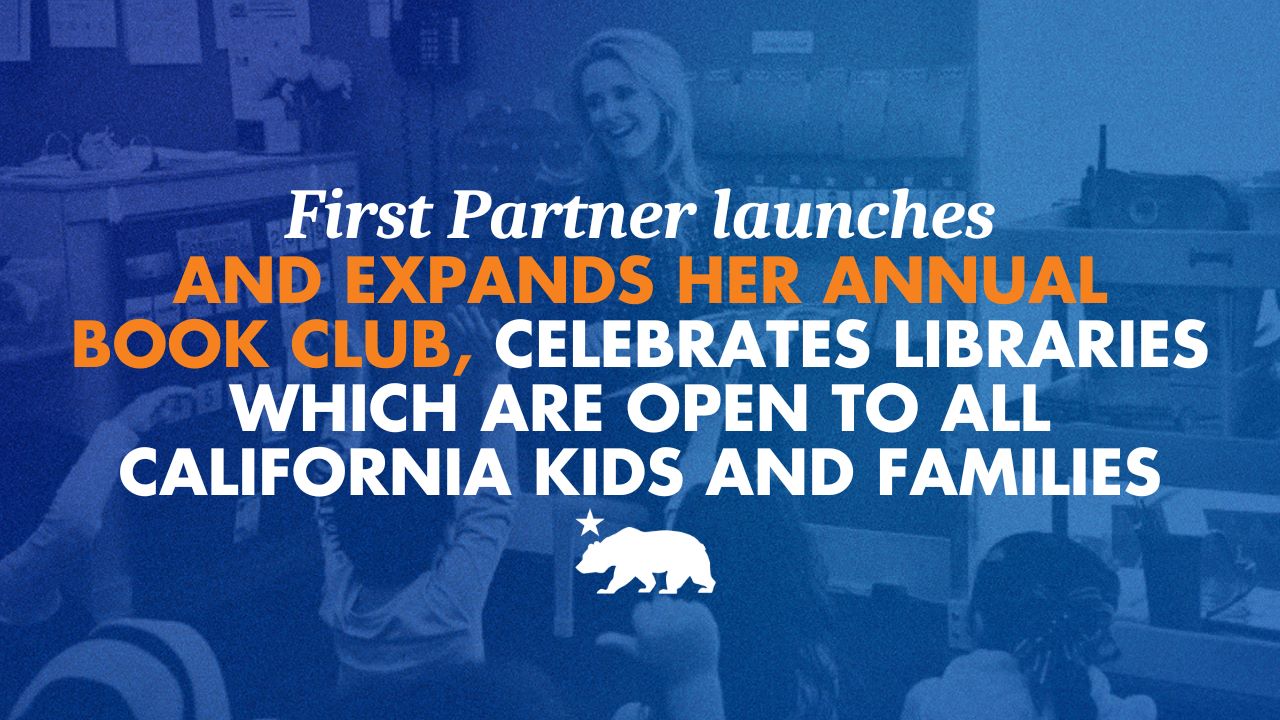
In a release this week, California First Partner Jennifer Siebel Newsom announced "investments in library programs that help connect more kids to libraries and reading over the summer" as well an expansion of her book club with a list of children’s books curated by librarians across the state.
“Books and storytelling have the power to change the trajectory of a life, especially the books we read when we’re young," Newsom said. "Our libraries create community and safe havens for us all, but particularly for our children, allowing them to escape into the joy and wonders of reading, disconnect from the online world, build early literacy skills, and so much more. Although we live in a time when beloved public resources like these are under increasing threat from the Administration in D.C., California is working to protect them as the community treasures they are for kids, families, and entire communities.”
Texas Governor Signs Restrictive School Library Bill

Via CBS Austin, a controversial new library bill, SB 13, is now law in Texas after Governor Greg Abbott signed the bill late last week.
"Signed into law by Governor Greg Abbott on Friday, SB 13 gives school boards the final say on what books are allowed in the libraries instead of their librarians," the report states. "The law also gives the Board a mechanism to review parent complaints."
Laney Hawes with the Texas Freedom to Read Project told the station that the bill is a potential logistical and censorship nightmare. "Librarians have master's degrees, right? And librarians are very specifically under a code of ethics where they don't make curatorial decisions based on what they like or don't like," Hawes told CBS. "We find that line to be devastating and terrifying, right? That a small group of people will decide what local community values look like."
Brooklyn Public Library's 'Books Unbanned' Teen Advocacy Program

Over at Book Riot, Kelly Jensen kicks off her weekly censorship news column with a look at the Brooklyn Public Library’s Books Unbanned program and its Freedom to Read Teen Advocacy Toolkit, "a robust program and toolkit" to support teen advocacy.
"While intellectual freedom and library support are the focus of The Freedom to Read Teen Advocacy Toolkit, it is adaptable and flexible to meet the interests and concerns in any community," Jensen writes. "This program’s outcomes include developing teen leadership skills, public speaking skills, and listening skills. It aims to foster a love for community engagement and citizenship, as well as an understanding of why and how public libraries and schools fill an important role in American democracy."
Senators Question Spotify's Audiobook Program

Via the excellent newsletter Broadband Breakfast, two U.S. Senators are questioning whether Spotify is engaged in "unlawful and deceptive" business practices.
"In this case, Spotify added 15 monthly hours of audiobook listening to its premium plans in 2023. By changing the default plan to a bundle, the cost was divided between the audiobook and music royalties, resulting in Spotify’s payouts to musicians and publishers dropping $150 million in the first year," the article explains.
Library of Congress Facing Down Steep Budget Cut
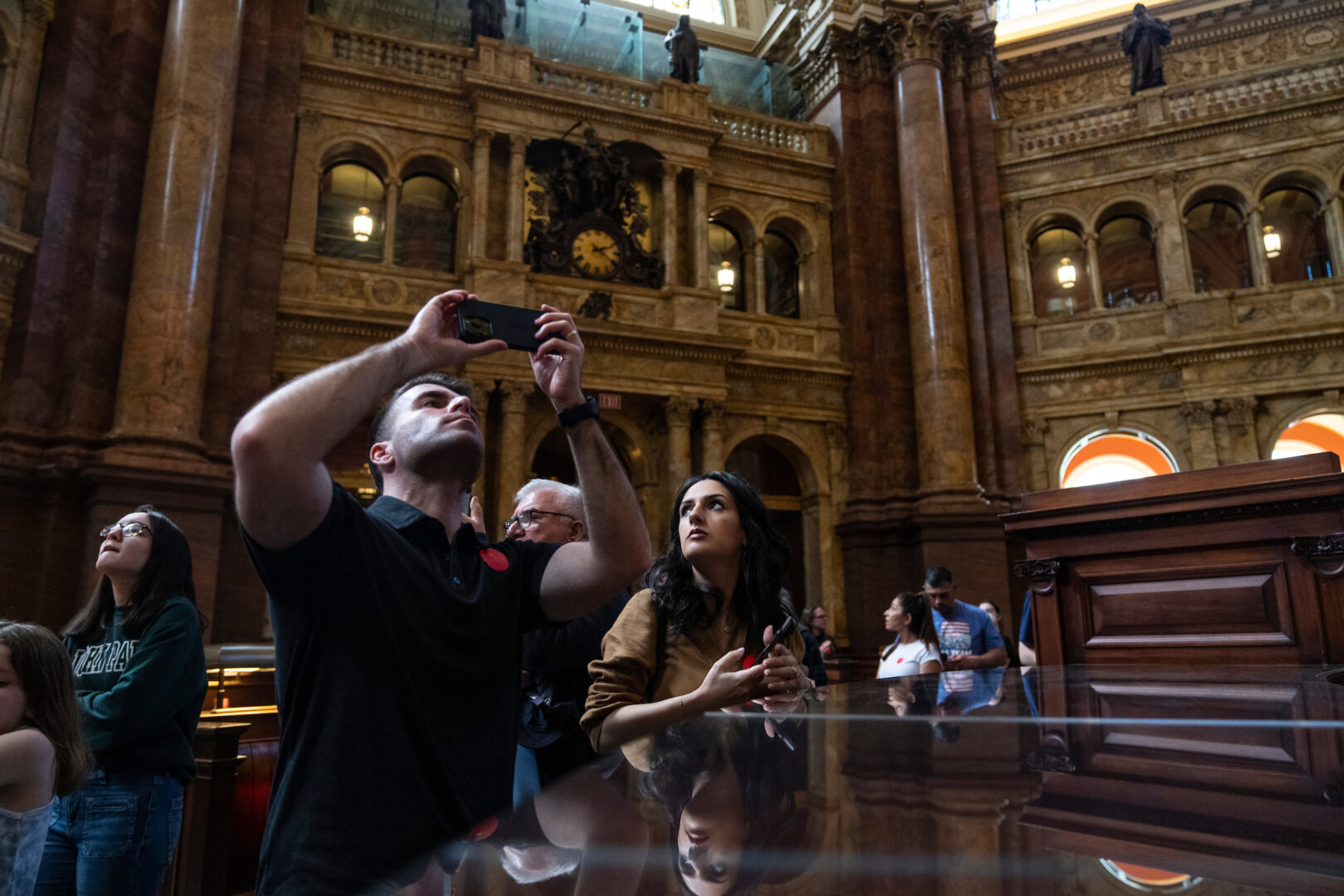
After the firing of Librarian of Congress Carla Hayden, Roll Call reports on Republican efforts to slash the Library of Congress budget.
"A spending proposal from House Republicans would lop off roughly 10% of funding for the nation’s library in the coming fiscal year, threatening staff and concerning the library’s defenders who see it as the latest Trump attack on cultural institutions," the report states. "Focus on the library—which is the main research arm of Congress and home to a vast collection of books and other cultural artifacts—has intensified since Trump unexpectedly fired longtime Librarian Carla Hayden on May 8. Days later, he removed Shira Perlmutter, who led the copyright office, in a similarly abrupt fashion."
And Finally This Week...
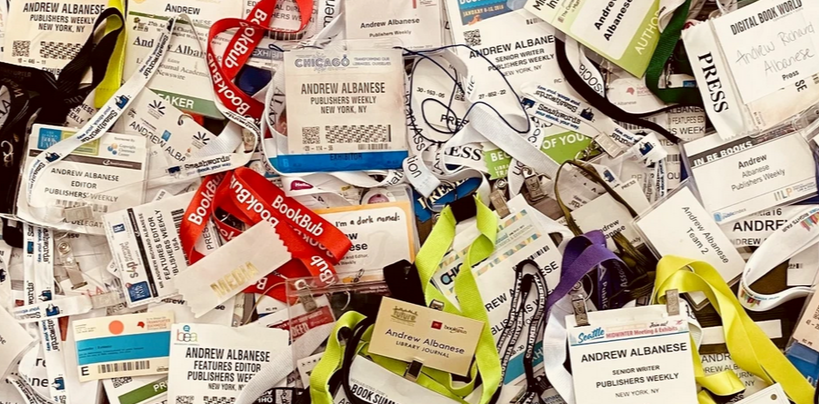
After our "soft launch" at the London Book Fair in March, we're happy to say that Words & Money has continued to grow. And today, at the American Library Association Annual Conference, we are officially launched. If you're here in Philadelphia, we'd love to see you. You can visit with us on the show floor, booth #1737.
We'll be going out far and wide to reach new readers and subscribers. And in the coming weeks, we'll be rolling out new features, including a podcast. We're grateful for your support, and we hope you'll share Words & Money with your networks and help us to establish a new media venture that properly centers libraries in the reading and writing enterprise.


















